Buying your first home is an exciting step, but it can feel overwhelming without the right preparation. This guide shares simple, practical first time home buyer tips to make the process easier. You’ll learn how to set a budget, save for a down payment, and get pre-approved for a mortgage. We’ll also help you research neighborhoods, decide on your must-haves, and find the perfect home.
Understanding real estate marketing is just as important. Knowing market trends, property values, and the best time to buy can make a big difference. Working with an experienced real estate agent can give you expert advice and access to listings that match your needs.
This guide covers all the key steps, from budgeting and saving to understanding closing costs, so you can confidently move forward and become a happy homeowner.
12 First Time Home Buyer Tips
Ready to buy your first home? These essential first time home buyer tips will guide you through finding the right property
1. Financial Preparation
One of the most crucial home buying tips is to get your finances in order before you start house hunting. Here are some essential tips to help you prepare financially:
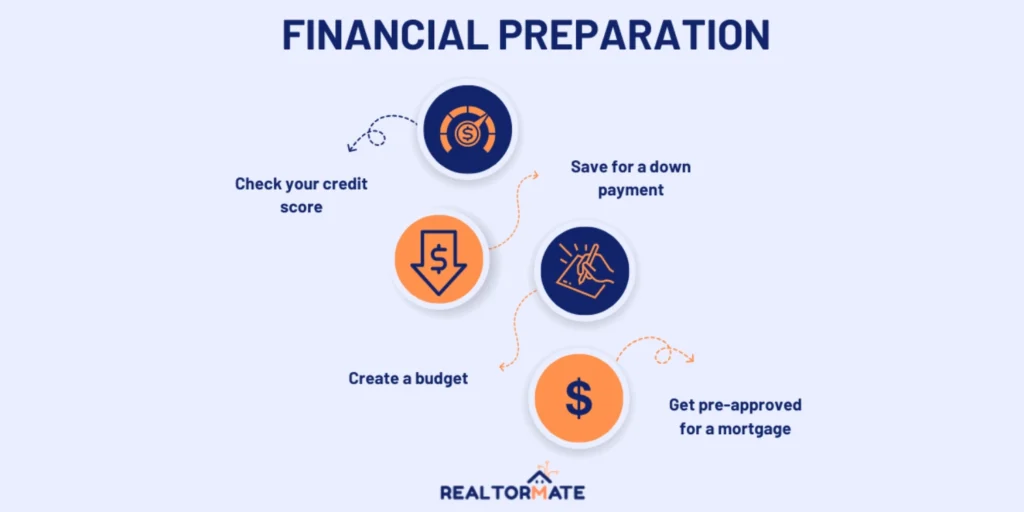
- Check your credit score: Your credit score affects the interest rate on your mortgage. Get a free credit report and work on improving your score if needed.
- Save for a down payment: Most lenders ask for a down payment, usually between 3% to 20% of the home’s price. Start saving early to meet this goal.
- Create a budget: Figure out how much you can afford to spend on a home by looking at your income, expenses, and debts. This is an important tip for first-time home buyers.
- Get pre-approved for a mortgage: A pre-approval letter from a lender shows sellers you’re serious and helps you know your price range.
2. Understanding the Housing Market
Familiarizing yourself with the housing market is another crucial aspect of first time home buying tips. Here are some tips for buyers to help you make the process smoother:
- Research neighborhoods: Look into different areas that fit your lifestyle and budget. Consider factors such as schools, crime rates, and proximity to amenities.
- Attend open houses: This allows you to get a feel for different types of homes and neighborhoods without the pressure of a private showing.
- Study market trends: Keep an eye on home prices, inventory levels, and how long properties typically stay on the market in your desired areas.
- Work with a real estate agent: An experienced agent can provide valuable insights and guide you through the home buying process. Find the best agents in your city. If you live in Toronto, this list of the best real estate agents in Toronto can help you find the experts in your area.
3. House Hunting Strategies
When it’s time to start looking for homes, keep these home buying tips in mind:
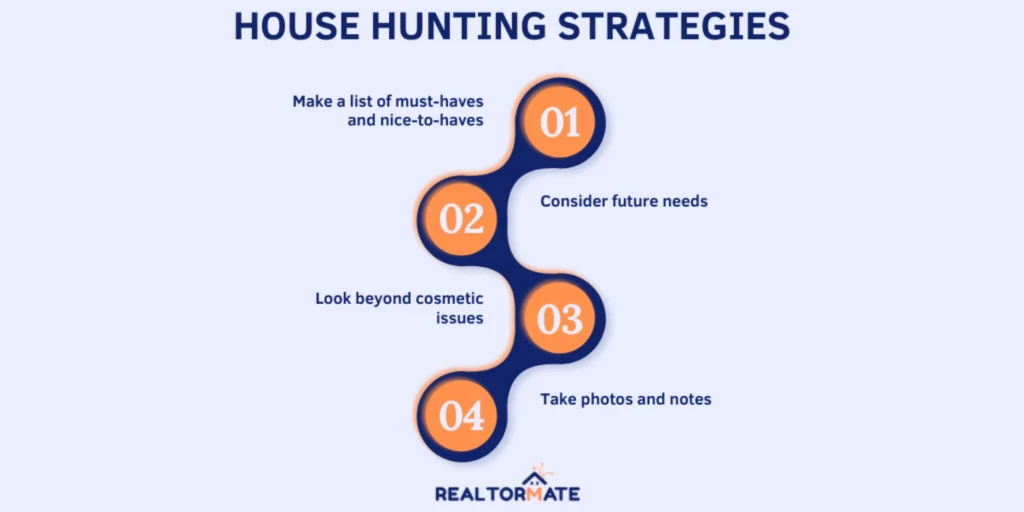
- Make a list of must-haves and nice-to-haves: Prioritize your needs and wants to focus your search effectively.
- Consider future needs: Think about how long you plan to stay in the home and whether it will accommodate potential life changes.
- Look beyond cosmetic issues: Don’t let easily fixable problems deter you from a potentially great home.
- Take photos and notes: Document each property you visit to help you remember and compare homes later.
4. Making an Offer and Negotiating
Once you’ve found the right home, use these tips for buying your first home during the offer and negotiation process:
- Check recent sales: Look at recent sales of similar homes nearby to decide a fair price for the home you’re interested in.
- Add protection clauses: Include clauses in your offer for home inspections, financing, and appraisals to protect yourself.
- Be ready for counteroffers: Be open to negotiations and flexible with some of the terms.
- Stay objective: Keep in mind that this is a business deal, and be ready to walk away if the offer isn’t right.
5. The Home Inspection Process
A thorough home inspection is one of the most important tips for home buyers. Here’s what you need to know:
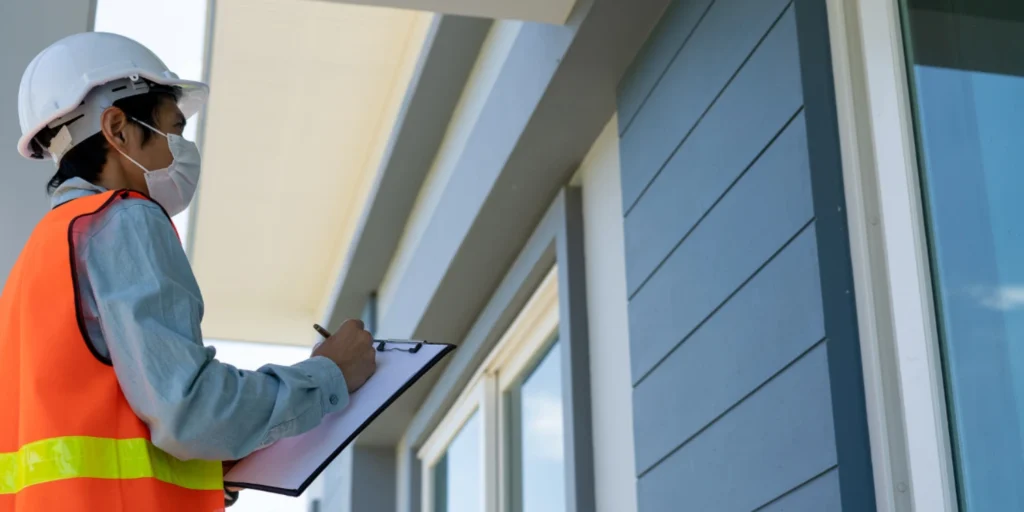
- Choose a qualified inspector: Look for a certified professional with experience in inspecting homes similar to the one you’re buying.
- Attend the inspection: Being present allows you to ask questions and gain a better understanding of the home’s condition.
- Review the inspection report carefully: Pay attention to major issues that could affect your decision to purchase the home.
- Negotiate repairs or credits: If significant problems are found, you may be able to negotiate with the seller for repairs or a price reduction.
6. Securing Your Mortgage
Finalizing your mortgage is a critical step in the home buying process. Keep these tips in mind:
- Compare loan options: Look at different types of mortgages and lenders to find the best terms for your situation.
- Lock in your interest rate: Once you’ve found a favorable rate, consider locking it in to protect against market fluctuations.
- Avoid major financial changes: Don’t make large purchases or open new credit accounts during the mortgage process, as this could affect your approval.
- Prepare for closing costs: Be ready to pay various fees associated with finalizing your mortgage and home purchase.
7. The Closing Process
As you approach the final stages of your home purchase, keep these tips for buying your first home in mind, Be sure to stay informed and updated by following real estate influencers for helpful tips and advice.

- Review all documents carefully: Ensure that all the terms and conditions in your closing documents are accurate and as agreed upon.
- Conduct a final walk-through: Check that the home is in the condition specified in your purchase agreement before closing.
- Bring necessary documents and payments: Have all required paperwork and funds ready for the closing day.
- Understand your obligations: Be clear on your responsibilities as a new homeowner, including property taxes and homeowners insurance.
8. After the Purchase
Even after you’ve closed on your new home, these first time home buyer tips can help you transition smoothly into homeownership:
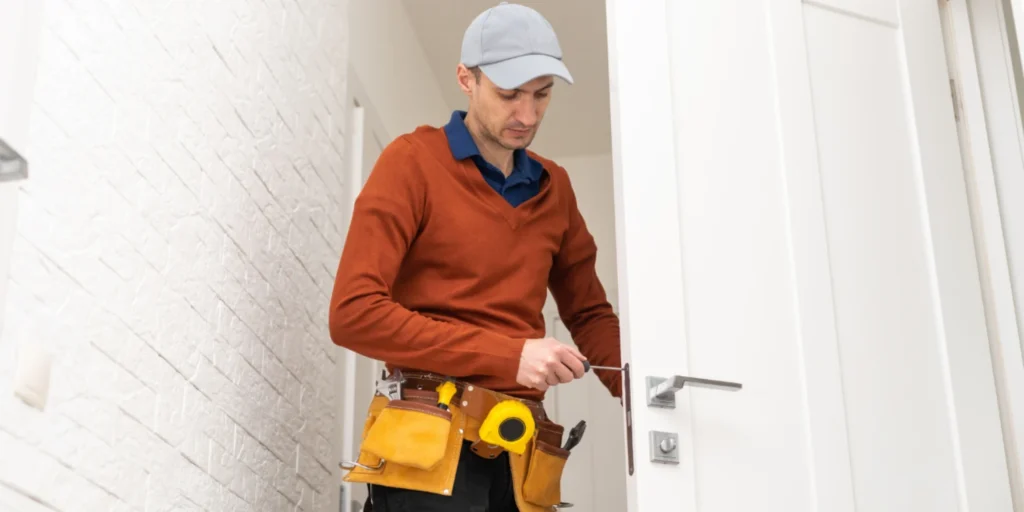
- Change the locks: For security reasons, replace or rekey all exterior locks.
- Set up utilities and services: Arrange for electricity, water, gas, internet, and other necessary services to be transferred or set up in your name.
- Create a home maintenance schedule: Regular maintenance can prevent costly repairs and keep your home in good condition.
- Build an emergency fund: Set aside money for unexpected home repairs or maintenance issues.
9. Financial Management for New Homeowners
Proper financial management is crucial for new homeowners. Here are some additional tips for home buyers to help you maintain financial stability:
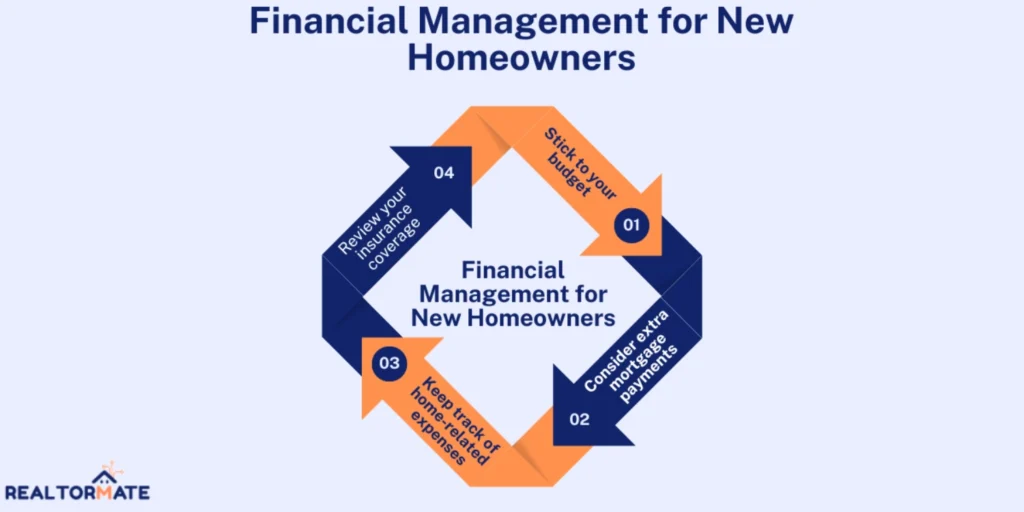
- Stick to your budget: Continue to live within your means and avoid overspending on home furnishings or renovations.
- Consider extra mortgage payments: If possible, make additional payments towards your principal to reduce your overall interest and pay off your mortgage faster.
- Keep track of home-related expenses: Maintain records of all home improvements and repairs for tax purposes and future resale value.
- Review your insurance coverage regularly: Ensure your homeowner’s insurance policy adequately covers your home and possessions as their value changes over time.
10. Building Equity in Your Home
As a new homeowner, building equity should be one of your long-term goals. Here are some home buying tips to help you increase your home’s value:
- Make strategic home improvements: Focus on upgrades that offer the best return on investment, such as kitchen and bathroom renovations.
- Keep up with routine maintenance: Regular upkeep prevents small issues from becoming costly problems and maintains your home’s value.
- Pay attention to curb appeal: A well-maintained exterior can significantly impact your home’s value and appeal to future buyers.
- Consider energy-efficient upgrades: Improvements that reduce energy consumption can increase your home’s value and save you money on utility bills.
11. Understanding Home Insurance Options
Home insurance is a critical aspect of homeownership that many first-time buyers overlook. Here are essential first time home buyer tips related to insurance:
- Compare Multiple Insurance Providers: When shopping for home insurance, it’s a good idea to get quotes from at least 3-5 different insurance companies. Don’t just focus on the price—make sure to carefully examine the coverage details. Additionally, consider bundling your home and auto insurance for potential discounts.
- Understand Different Coverage Types: Learn about basic homeowners insurance (HO-3) policies to cover your home, and consider adding extra protection for specific risks. Don’t forget to look into coverage for valuable personal items to keep them safe as well.
- Assess Your Specific Risk Factors: Consider location-specific risks like floods, earthquakes, or hurricanes and decide if you need extra coverage for them. Also, keep in mind how your home’s construction can affect your insurance rates.
12. Managing Home Maintenance Costs
Effective home maintenance is crucial for preserving your property’s value. These home buying tips will help you budget and plan:
- Create a Comprehensive Schedule: Create checklists for annual and seasonal tasks. Set aside a budget for regular repairs and possible replacements. Keep a record of maintenance work for future reference.
- Learn Basic DIY Home Repair Skills: Take online classes or workshops to learn about home maintenance. Get some basic tools for repairs. Understand when you can fix things on your own and when you need to hire a professional.
- Build a Home Maintenance Emergency Fund: Try to save 1-3% of your home’s value each year for repairs. Focus on important systems like heating, cooling, roofing, and plumbing. Check and update your maintenance budget regularly.
Conclusion
Becoming a homeowner is a significant milestone, and these first time home buyer tips are designed to help you navigate the process with confidence. By following these tips for buying a home, you’ll be well-prepared to make informed decisions and avoid common pitfalls. Remember that every home buying journey is unique, so don’t hesitate to seek advice from professionals and adapt these tips for buying your first home to your specific situation.
With patience, diligence, and the right guidance, you’ll be well on your way to finding and purchasing your perfect first home. Keep these home buying tips handy throughout your journey, and you’ll be better equipped to handle the challenges and enjoy the rewards of homeownership. Congratulations on taking this important step towards achieving your dream of owning a home!
FAQs
1. How Much Money Do I Really Need to Buy a Home?
To purchase your first home, you’ll typically need:
- 3-20% down payment
- Closing costs (2-5% of home value)
- Emergency fund (3-6 months of expenses)
- Additional funds for moving and initial repairs
2. What Credit Score Do I Need to Buy a Home?
Most lenders prefer:
- Minimum credit score: 620
- Ideal credit score: 700+
- Higher scores mean better mortgage rates
- Lower scores might require larger down payments
3. How Do I Prepare Financially for Home Buying?
Comprehensive financial preparation involves multiple steps:
- Check and improve credit score
- Save consistently for a down payment
- Reduce existing debts
- Create a detailed budget
- Build emergency savings
- Get pre-approved for a mortgage
4. What Hidden Costs Should I Expect When Buying a Home?
First-time buyers often overlook these expenses:
Purchasing a home involves more than just the mortgage payment. Unexpected costs can quickly accumulate, including property taxes, homeowners insurance, maintenance expenses, and potential renovation needs. Budget for these additional financial responsibilities to avoid surprises and ensure a smooth homeownership experience.
5. How Long Should I Plan to Stay in My First Home?
Experts recommend:
- Minimum 3-5 years of residence.
- Allows property value to potentially appreciate.
- Helps recover initial transaction costs.
- Provides stability and potential equity building.
